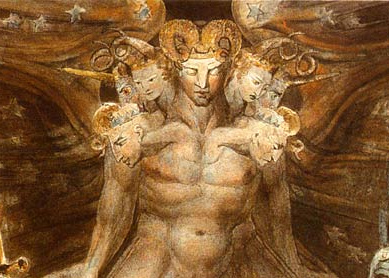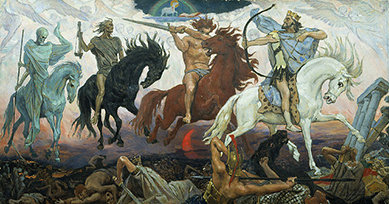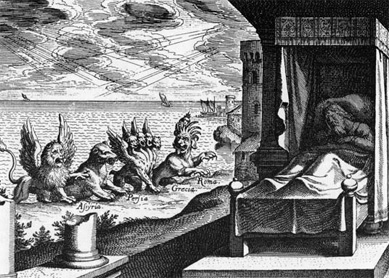The bizarre image of eating a scroll is a pivotal moment in Ezekiel’s as well as Revelation’s prophetic visions.
Prophetic and apocalyptic visions are known for their peculiar knack of blending the everyday with the supernatural or surreal. Both Ezekiel and the book of Revelation turn the unremarkable act of eating into a powerful revelatory act. Ezekiel and the Seer, as the first-person narrator of the Apocalypse of John is often called, are commanded to “eat this scroll” in order to receive God’s heavenly knowledge and to be able to act upon it as instructed.
Who instructs Ezekiel to eat the scroll?
Both texts depict their protagonist receiving instructions from heaven. In Ezekiel, the prophet first experiences an apparition that is the “likeness of the glory of the Lord.” It seems to be this manifestation of the divine which speaks to Ezekiel, while an outstretched hand holds a scroll. The heavenly voice instructs him to “eat what is offered”; to “eat this scroll, and go, speak to the house of Israel” (Ezek 3:1). Ezekiel is obedient, but the instructions are repeated by the divine voice. The first-person narrator describes the taste of the scroll as being as sweet as honey. When the voice speaks again it is to implore Ezekiel once more to pronounce God’s words to Israel. There seems to be a relationship between the ingestion of the scroll, its sweet taste, and the ability to speak God’s words.
Did Revelation simply copy Ezekiel?
Revelation is known for its habit of alluding to the earlier prophetic texts of the Hebrew Bible, even if it never quotes them word for word. However, the Apocalypse uses multiple overlapping allusions to evoke new meanings, and the example of the little scroll is no exception. While Ezekiel hears the divine voice directly, John, as is often the case in apocalyptic texts, experiences his revelation with the help of angelic mediators. It is not clear in the text whether the voice that John hears is God’s or the angel’s (Rev 10:1), but it is this angel, rather than a disembodied hand (Ezek 2:9) who holds the scroll. John, like Ezekiel, is instructed to eat the scroll, but unlike the scroll in Ezekiel, the taste is complex. It starts out sweet like honey, but as John ingests it, it curdles his stomach: “when I had eaten it, my stomach was made bitter” (Rev 10:10). Again like Ezekiel, the Seer is instructed to deliver a divine pronouncement, but this one is not just to Israel, whose language is easy for Ezekiel, but to all nations and languages. In both Ezekiel’s and in Revelation’s borrowing of the trope, eating the scroll signals an important turning point in the prophet’s role.
Why do the scrolls taste sweet and bitter?
Most interpreters of these scroll passages focus on a possible correlation between the flavor of the scroll and the content of the divine message. A sweet taste signifies the sweetness of God’s words, just like in Psalms (e.g., Ps 119:103), while bitterness could point to the devastating message that John must pass on about the coming judgment. But this type of eating is remarkable in itself and occurs in many other texts that use the eating of divine food in this way. In another apocalyptic text, 4 Ezra, the titular Ezra’s revelatory experiences culminate in him consuming a fiery cup sent from heaven, which allows him to dictate books of scripture for scribes to write down.
What does eating otherworldly food do?
In these and other examples, the eaters are changed by the food and are able to receive and transmit divine knowledge. This type of eating, called hierophagy, is a powerful literary tool that ancient authors used to signify the transformation of the eater in a way that associates them intimately with the divine realm. Tasting and ingesting otherworldly food dissolves the boundaries between heaven and earth in the same way that the mouth and stomach break down food and dissolve it into the body. So whether scroll, cup, or other heavenly morsel, biblical authors were making use of a known trope to locate their characters close to God and imbue them with divine authority.
Bibliography
- Warren, Meredith J. C. Food and Transformation in Ancient Mediterranean Literature. Atlanta: SBL Press, 2019.
- Tilford, Nicole. Sensing World, Sensing Wisdom: The Cognitive Foundation of Biblical Metaphors. Atlanta: SBL Press, 2017.
- Avrahami, Yael. The Senses of Scripture: Sensory Perception in the Hebrew Bible. New York: T&T Clark, 2012.




